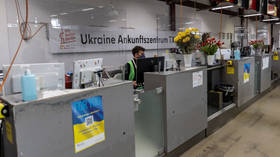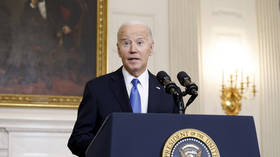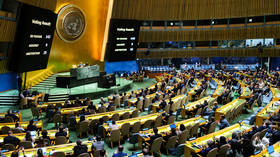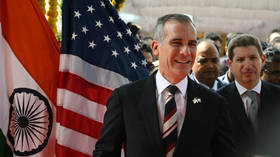Ukrainians are Germany’s biggest foreign welfare recipient group – media
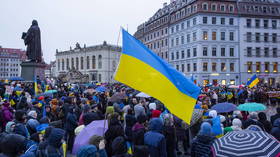
Ukrainians residing in Germany have emerged as the biggest grouping of foreign nationals relying on government welfare payments, the tabloid Bild reported on Saturday, citing data from the German Federal Employment Agency (BA).
Out of 5.5 million welfare recipients in Germany, only about half are German citizens, the media outlet reported. As of March 2023, almost 2.6 million people getting “standard benefits” from the state were foreigners, according to BA’s Migration Monitor program.
Ukrainians constitute the largest proportion of non-German welfare recipients, amounting to about 30% of their number. Syrians form the second-largest group, accounting for another 20%. According to government data, as many as 65.6% of Ukrainians living in Germany – or 707,700 people – receive financial aid from the government.
More than half of all Syrians residing in the country, as well as 47.1% of Afghans living there, are also dependent on the German welfare system, Bild reported, adding that, among Germans themselves, 5.3% are on welfare.
People entitled to welfare payments receive an average of €502 ($554) for a single person and €451 ($497) per person for a couple each week. Persons with kids get an additional €318 ($350) and €420 ($463), depending on the child’s age. The state also pays for the rent, heating and education of eligible persons.
Asylum seekers and people with the so-called “tolerated stay” status could get between €369 ($407) and €410 ($452) weekly, depending on the circumstances, plus an additional €278–€364 ($306–$401) per child if applicable. Only those who are officially granted asylum in Germany could then apply for “standard benefits.”
This rule does not affect Ukrainians, though. Under the existing regulations, they do not apply for asylum and are automatically entitled to regular welfare payments, according to Bild. Berlin allocated a total of €43.8 ($48.3 billion) for welfare payments and associated costs within this year’s budget, the media outlet reported.
The existing scheme sparked criticism from Carsten Linnemann, the general secretary of Germany’s biggest opposition party – the Christian Democratic Union. The conservative politician demanded a “fundamental” overhaul of the welfare system, which he said should be more focused on the immigrants’ “integration” into the German labor market.
“We have a shortage of skilled workers and some 2.5 million unemployed at the same time, as well as a high level of immigration into the social system,” he said, demanding the government do more to “get as many people as possible out of the social assistance [system] and into the job market.”
A recent survey conducted jointly by several German research institutions and the federal migration agency showed that only 18% of Ukrainian refugees in Germany had found a job. At the same time, 44% of them said they would like to stay in the country. The number of those willing to remain has grown by five percentage points, up from 39% in a poll conducted last summer.
Germany has accepted more than one million Ukrainians since the outbreak of the conflict a year and a half ago. The large influx of Ukrainians placed a strain on the EU’s biggest economy. In October 2022, 23 municipal leaders across the country warned that local authorities had exhausted all resources to aid new arrivals. In February 2023, Interior Minister Nancy Faeser called for a more even distribution of Ukrainian refugees among EU member states.

